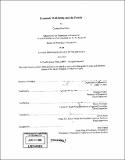Economic well-being and the family
Author(s)
Perry, Cynthia D
DownloadFull printable version (4.879Mb)
Other Contributors
Massachusetts Institute of Technology. Dept. of Economics.
Advisor
Jonathan Gruber, Daron Acemoglu and David Autor.
Terms of use
Metadata
Show full item recordAbstract
This thesis examines the well-being of families under changing labor market conditions, changes in the legal environment and changes in public policy. The first chapter asks how women's fertility decisions are affected by changing labor market conditions. Chapter two examines whether divorce shocks persist into old age, and the final chapter studies how the elderly alter their living arrangements in response to changes in Social Security benefit payments. Chapter one exploits exogenous variation in labor demand for women to measure how total fertility responds to changes in female earnings. The principal finding is that women who are likely to face lower wage offers - those who have completed high school or are high school dropouts - reduce their total fertility when labor market conditions are better. In contrast, women who are likely to face higher wage offers - those who have completed at least some college - increase their total fertility when labor market conditions improve. Chapter two exploits variation in property division laws to examine whether there is a persistent effect of such laws on the well-being of ever-divorced women in retirement. The results suggest that a woman who divorces in a state and year where all pension assets are recognized as marital property has higher per capita household income in retirement than a woman who divorced in a state where pensions were not considered marital property. The results are consistent with some persistence in the effect of property division laws at divorce, but the effects do not appear to be pervasive enough to have a significant impact on other measures of well-being in retirement, including whether a woman lives independently, whether she or a member of her household owns her home, whether she receives government assistance, and whether she receives pension income. Chapter three examines how elderly individuals change their living arrangements when their social security benefits change. Findings suggest that living arrangements are substantially more elastically demanded by non-married elderly than previous studies, and that reductions in Social Security benefits would significantly alter the living arrangements of the elderly. Most of these effects appear to be concentrated among the less educated elderly.
Description
Thesis (Ph. D.)--Massachusetts Institute of Technology, Dept. of Economics, 2004. Includes bibliographical references.
Date issued
2004Department
Massachusetts Institute of Technology. Department of EconomicsPublisher
Massachusetts Institute of Technology
Keywords
Economics.